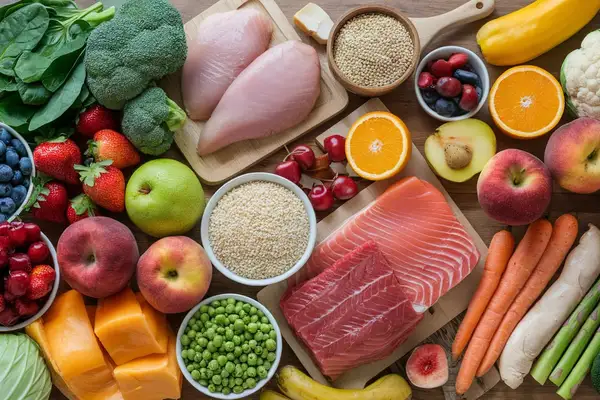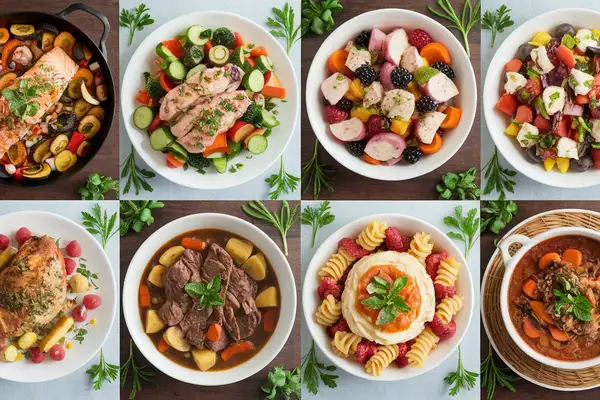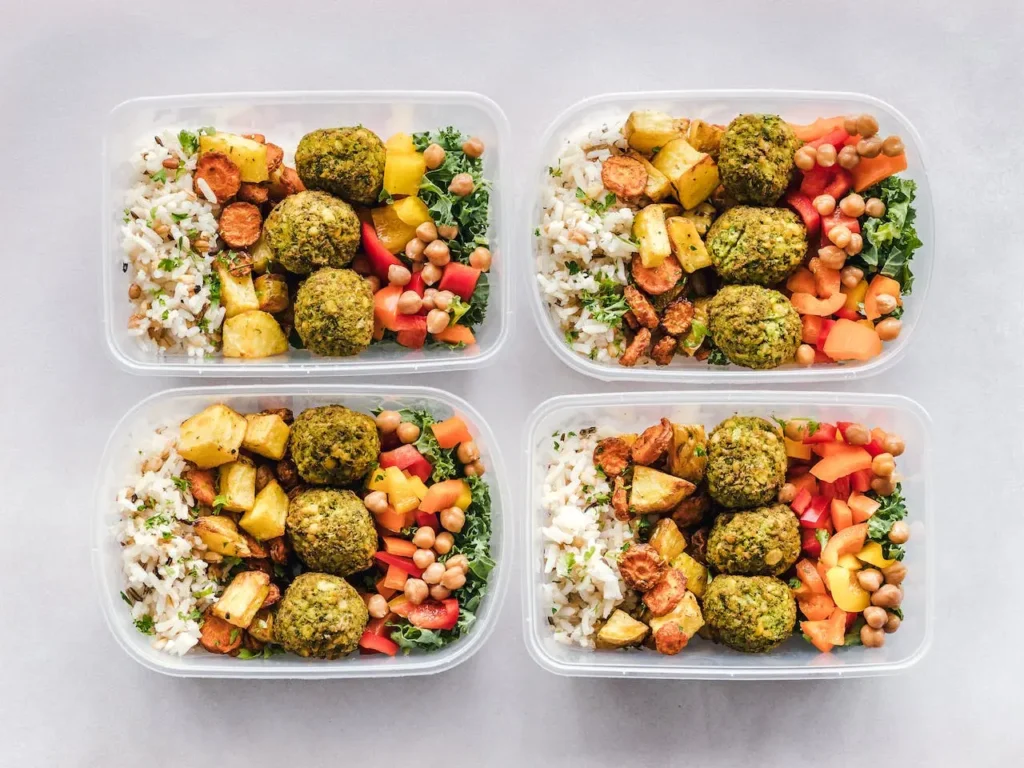Crohn’s Disease Diet: 7-Day Meal Plan for Crohn’s Disease
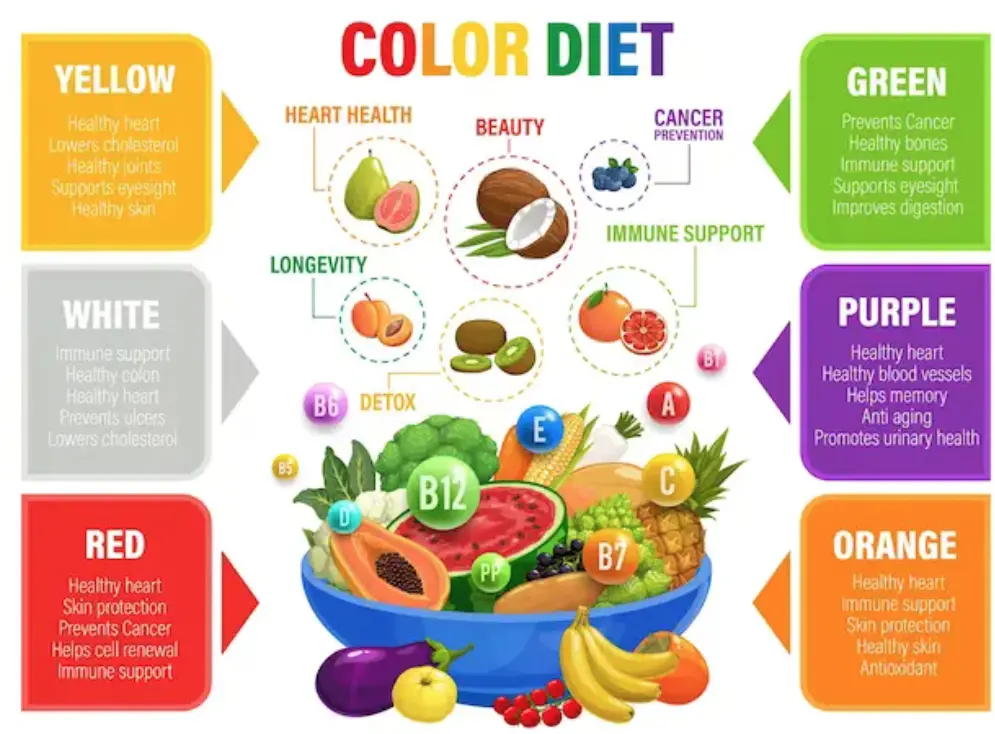
- Key Nutrients for Crohn's Disease Management
- What Foods Are Good for Crohn's Disease?
- Foods to Avoid With Crohn's Disease
- 7-Day Meal Plan for Crohn's Disease
- Day 1
- Day 2
- Day 3
- Day 4
- Day 5
- Day 6
- Day 7
- Benefits of Crohn's Disease Diet Plan
- Tips For Managing Crohn's Disease Through Diet
- Resources for Crohn's Disease Diet
- Conclusion
- Frequently Asked Questions (FAQs)
This post may contain affiliate links, meaning I may earn a commission if you make a purchase, at no extra cost to you. I only recommend products I trust. Thank you for your support.
Crohn’s Disease is a chronic inflammatory bowel disease that affects the gastrointestinal tract.
It causes inflammation and ulceration in different parts of the digestive system, leading to various symptoms such as abdominal pain, diarrhea, fatigue, and weight loss.
The exact cause of Crohn’s Disease is still unknown, but researchers believe it may involve a combination of genetic, environmental, and immune factors.
Living with Crohn’s Disease can significantly impact an individual’s daily life. It can cause discomfort, pain, and uncertainty about managing symptoms.
However, with the right approach, including a well-planned Crohn’s disease diet plan and a 7-day meal plan for Crohn’s disease, it is possible to alleviate symptoms and improve quality of life.
Key Nutrients for Crohn’s Disease Management
Managing Crohn’s disease effectively involves ensuring that you get the essential nutrients to support your overall health and help manage symptoms.
Here are some key nutrients that are particularly important for individuals with Crohn’s disease:
1. Protein:
- Protein is crucial for tissue repair, which is especially important for individuals with Crohn’s disease as the digestive tract can be inflamed and damaged.
- Adequate protein intake supports the healing of intestinal tissues, helps maintain muscle mass (important during periods of inflammation and reduced appetite), and supports a healthy immune system.
2. Iron:
- Iron deficiency is common in Crohn’s due to bleeding, inflammation, and reduced absorption in the intestines.
- Iron supports the production of red blood cells, which transport oxygen throughout the body. Adequate iron levels help prevent anemia and fatigue.
3. Calcium:
- Individuals with Crohn’s disease are at risk of calcium deficiency due to reduced intake or absorption issues.
- Calcium is essential for bone health and strength and prevents osteoporosis due to long-term inflammation and the use of corticosteroids.
4. Vitamin D:
- Adequate vitamin D levels support bone health, reduce inflammation, and help regulate the immune system, which can be dysregulated in Crohn’s disease.
5. Vitamin B12:
- Vitamin B12 absorption can be impaired, especially if the ileum (part of the small intestine) is affected by Crohn’s.
- Vitamin B12 is essential for nerve function, red blood cell production, and overall energy levels.
6. Folate (Vitamin B9):
- Folate is important for cell division and repair, which is crucial in an inflamed digestive tract.
- Folate supports overall cellular health and helps prevent anemia. It’s particularly important during periods of active inflammation and rapid cell turnover.
7. Magnesium:
- Magnesium can be lost through diarrhea, which is common in Crohn’s disease.
- Magnesium is essential for muscle and nerve function, energy production, and maintaining electrolyte balance.
8. Zinc:
- Zinc plays a role in immune function and wound healing, which can be impaired in Crohn’s disease.
- Adequate zinc levels support immune health, help reduce inflammation, and promote proper healing of intestinal tissues
9. Omega-3 Fatty Acids
- Omega-3 fatty acids have anti-inflammatory properties, which can benefit individuals with inflammatory bowel diseases like Crohn’s.
- Omega-3s help reduce inflammation in the digestive tract and may improve the overall health of those with Crohn’s disease.
10. Potassium
- Potassium can be depleted through diarrhea, which is common in Crohn’s disease during flare-ups.
- Potassium is essential for fluid balance, muscle function, and nerve signaling.

What Foods Are Good for Crohn’s Disease?
Managing inflammation in the colon, particularly for conditions like Crohn’s disease, involves a careful selection of foods that can help soothe the digestive tract and avoid triggering flare-ups.
When preparing a Crohn’s disease grocery list, it’s important to ensure you include foods for IBD or foods to heal inflamed colon in your 7-day meal plan for Crohn’s disease.
Here are some of the best foods to eat with Crohn’s disease diet recipes:
1. Low-Fiber Fruits and Vegetables:
These are easier on the digestive system. These include:
- Bananas
- Cantaloupe
- Cooked carrots
- Squash
- Zucchini
- Green beans
- Potatoes (without the skin)
2. Lean Proteins:
Protein is essential for healing and maintaining muscle mass. Good choices are:
- Chicken breast (Skinless)
- Fish (salmon, tilapia, tuna, mackerel)
- Turkey
- Fish
- Eggs
- Tofu
3. Refined Grains:
While whole grains are generally healthier, people with Crohn’s might tolerate refined grains better during flare-ups:
- White bread
- White rice
- Plain pasta
4. Dairy Alternatives:
Many people with Crohn’s are lactose intolerant. Lactose-free options can include:
- Lactose-free milk
- Almond milk
- Soy milk
5. Healthy Fats:
Some sources of healthy fats that are generally well-tolerated include:
- Olive oil
- Avocado oil
- Flaxseed oil
- Walnut butter
- Chia seeds
6. Beverages for Hydration:
Staying hydrated is crucial for people with Chron’s disease.
- Water (8 cups per day)
- Clear soups made with broths
- Herbal tea
Foods to Avoid With Crohn’s Disease
Avoiding certain foods can help manage symptoms and reduce the frequency of flare-ups in Crohn’s disease.
Here is a comprehensive list of trigger foods to avoid with Crohn’s disease to prevent symptom exacerbation:
1. Whole Grains
These whole grains can be difficult to digest and may worsen symptoms:
- Brown rice
- Whole wheat bread
- Whole wheat pasta
- Quinoa
- Barley
- Oats
2. Raw Vegetables
These raw vegetables can be irritating and may worsen Chron’s disease symptoms:
- Broccoli
- Cauliflower
- Brussels sprouts
- Cabbage
- Kale
- Spinach
- Onions
- Peppers
- Corn
3. Raw Fruits
These can be difficult to digest and might worsen symptoms:
- Apples with skin
- Berries (strawberries, blackberries, raspberries)
- Grapes
- Oranges
- Pineapple
- Pears
4. Legumes
- Beans (kidney beans, black beans, chickpeas)
- Lentils
- Peas
5. Nuts and Seeds
These can be hard to digest and worsen symptoms:
- Almonds
- Walnuts
- Sunflower seeds
- Flaxseeds
6. Dairy Products
Many individuals with Crohn’s Disease have lactose intolerance or sensitivities to dairy products. If you’re lactose intolerant or sensitive, avoid:
- Milk
- Cheese
- Ice cream
- Cream
- Yogurt (unless lactose-free)
7. High-Fat Foods
These fatty foods, especially those high in saturated and trans fats, can cause inflammation and worsen symptoms:
- Fried chicken
- French fries
- Doughnuts
- Onion rings
- Bacon
- Sausage
- Fatty cuts of beef or pork
- Butter and margarine
8. Spicy Foods
These can irritate the digestive tract:
- Hot sauce
- Salsa
- Chili sauce
- Curry
9. Processed Foods
- Hot dogs
- Deli meats
- Salami
- Chips
- Pretzels
- Popcorn
- Candy
- Pastries
- Cakes
- Cookies
10. Carbonated Beverages
- Soda
- Sparkling water
- Beer
11. Artificial Sweeteners
Products containing these artificial sweeteners can cause digestive upset:
- Sorbitol
- Mannitol
- Aspartame
- Sucralose
- Saccharin
7-Day Meal Plan for Crohn’s Disease
This 7 day meal plan for Crohn’s disease focuses on easily digestible foods that are gentle on the digestive system, helping to manage inflammation and avoid flare-ups for those with Crohn’s disease.

Day 1
Breakfast:
- Scrambled Eggs with Spinach: Fluffy scrambled eggs mixed with sautéed spinach.
Lunch:
- Grilled Chicken Breast with Steamed Green Beans: Tender grilled chicken breast paired with lightly steamed green beans and a side of white rice.
- Baked Potato with Tuna: Baked potato topped with flaked tuna, Greek yogurt, and chopped chives.
Dinner:
- Baked Salmon with Steamed Zucchini: Oven-baked salmon fillet served with lightly steamed zucchini slices.
- Mashed Potatoes (Without Skin): Creamy mashed potatoes made without the skin, providing an easy-to-digest side dish.
Snacks:
- Applesauce
- Lactose-free yogurt with a drizzle of honey

Day 2
Breakfast:
- Chia Pudding: Chia seeds soaked in almond milk, topped with fresh berries and a sprinkle of flaxseeds.
Lunch:
- Turkey and Avocado on White Bread: Slices of lean turkey breast and creamy avocado sandwiched between slices of soft white bread, offering a satisfying blend of protein and healthy fats.
- Side of Cooked Zucchini: Zucchini slices are cooked until tender, providing a light and nutritious vegetable side to your meal.
Dinner:
- Baked Tilapia with Sautéed Squash: Flaky baked tilapia fillet paired with sautéed squash in a savory olive oil preparation.
- Steamed Asparagus: Fresh asparagus spears lightly steamed for a side of greens.
Snacks:
- Cantaloupe slices
- Plain rice cakes with walnut butter

Day 3
Breakfast:
- Cottage Cheese with Berries: Creamy cottage cheese topped with fresh mixed berries (blueberries, strawberries).
Lunch:
- Grilled Chicken Breast with Steamed Zucchini: Another serving of tender grilled chicken breast, this time paired with lightly steamed zucchini.
- Quinoa Bowl: Quinoa bowl with black beans, corn, cherry tomatoes, and avocado slices, drizzled with lime vinaigrette.
Dinner:
- Baked Turkey Breast with Cooked Green Beans: Tender baked turkey breast served with cooked green beans, creating a hearty and nutritious plate.
- Chicken and Vegetable Stir-Fry: Tender chicken breast strips stir-fried with mixed vegetables in a savory sauce, served over brown rice.
Snacks:
- Applesauce
- Lactose-free yogurt with chia seeds
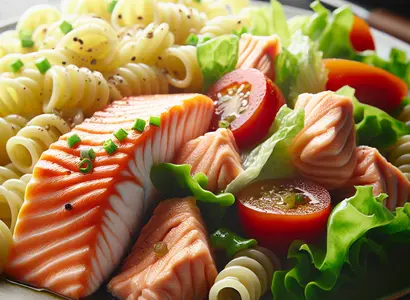
Day 4
Breakfast:
- Poached Eggs with Spinach: Poached eggs served over wilted spinach on whole grain toast.
Lunch:
- Salmon Salad: Cooked salmon flakes served on a bed of crisp lettuce with a drizzle of olive oil dressing, creating a refreshing and nutritious salad option.
- Plain Pasta: Cooked pasta tossed with a light olive oil and herb dressing, offering a simple and satisfying carbohydrate choice.
Dinner:
- Grilled Fish Tacos: Grilled fish (such as tilapia or cod) wrapped in corn tortillas with cabbage slaw and avocado.
- Steamed Broccoli: Steamed broccoli florets for added fiber and nutrients.
Snacks:
- Smoothie with almond milk, banana, and flaxseed oil
- Rice pudding

Day 5
Breakfast:
- Greek Yogurt Parfait: Creamy Greek yogurt layered with granola and sliced peaches.
Lunch:
- Grilled Shrimp with Sautéed Zucchini: Juicy grilled shrimp paired with zucchini sautéed in garlic and olive oil, creating a flavorful and protein-rich dish.
- Steamed White Rice and Cooked Green Beans: Fluffy white rice served with tender cooked green beans, providing a classic and comforting combination of grains and vegetables.
Dinner:
- Baked Tofu with Sautéed Zucchini: Baked tofu cubes served with zucchini sautéed in olive oil, offering a nutritious and plant-based meal option.
- Steamed Green Beans: Fresh green beans steamed to perfection.
Snacks:
- Plain rice cakes with walnut butter
- Applesauce

Day 6
Breakfast:
- Oatmeal with Berries: Warm oatmeal topped with fresh berries (strawberries, blueberries, raspberries).
Lunch:
- Baked Cod with Cooked Carrots: Flaky baked cod fillet served with tender cooked carrots, creating a light and wholesome seafood dish.
- Shrimp Stir-Fry: Sautéed shrimp with bell peppers, broccoli, and snap peas in a light soy-ginger sauce, served over brown rice.
Dinner:
- Baked Turkey Breast with Cooked Green Beans: Another serving of tender baked turkey breast, this time paired with cooked green beans for a balanced and filling meal.
- Stuffed Bell Peppers: Bell peppers stuffed with lean ground turkey, quinoa, and diced tomatoes, baked until tender.
Snacks:
- Carrot sticks with hummus
- Unsalted nuts

Day 7
Breakfast:
- Banana Smoothie: A creamy smoothie made with ripe bananas, almond milk, and a scoop of protein powder.
Lunch:
- Grilled Tilapia with Sautéed Squash: Grilled tilapia fillet paired with sautéed squash in a savory preparation, offering a delicious and nutritious seafood option.
Dinner:
- Baked Salmon with Steamed Green Beans: Salmon fillet baked to perfection and served with steamed green beans, creating a flavorful and protein-rich meal.
- Quinoa Pilaf: Quinoa cooked with onions, garlic, and vegetable broth.
Snacks:
- 1 Banana
- Smoothie with almond milk, banana, and flaxseed oil
Benefits of Crohn’s Disease Diet Plan
The benefits of a Crohn’s disease diet plan cannot be overstated as it directly affects the gastrointestinal tract.
A well-designed 7-day meal plan for Crohn’s disease is vital for managing symptoms, supporting nutritional needs, reducing inflammation, promoting healing, and enhancing overall quality of life.
While there is no specific diet that works for everyone with Crohn’s, certain dietary strategies can help alleviate symptoms and promote overall gut health.
Here are the key points highlighting the importance of a tailored Crohn’s disease diet plan:
1. Symptom Management
- A well-planned 7-day meal plan for Crohn’s disease can help reduce the frequency and severity of flare-ups by avoiding trigger foods.
- Certain foods can aggravate symptoms like abdominal pain, diarrhea, bloating, and cramping. A specialized diet can help alleviate these symptoms.
2. Nutrient Adequacy
- Crohn’s disease can lead to malabsorption of nutrients due to inflammation and damage to the intestines.
- A carefully planned 7-day meal plan for Crohn’s disease ensures adequate intake of essential nutrients like protein, vitamins, and minerals.
3. Inflammation Reduction
- Certain foods, such as those rich in omega-3 fatty acids and antioxidants, have anti-inflammatory properties that can help reduce inflammation in the digestive tract.
- Identifying and avoiding foods that trigger inflammation is key to managing Crohn’s disease symptoms and promoting gut health.
4. Digestive Health
- A 7-day meal plan for Crohn’s disease includes foods that are easier to digest, reducing strain on the digestive system during periods of inflammation.
- Certain foods, like probiotics and prebiotics, support a healthy gut microbiome, which is essential for overall digestive health.
5. Bone Health
- A 7-day meal plan for Crohn’s disease ensures adequate intake of calcium and vitamin D thus supporting bone health and preventing osteoporosis.
6. Energy
- A 7-day meal plan for Crohn’s disease includes foods that provide proper nutrition, supporting energy levels and reducing fatigue.
7. Weight Management
- A well-balanced Chron’s diet plan helps prevent malnutrition and unintended weight loss, common challenges for individuals with Crohn’s disease.
- For those at risk of being underweight or overweight, a tailored diet plan helps achieve and maintain a healthy weight.
8. Individualized Approach
- Each person with Crohn’s disease may have different triggers and tolerances, so a personalized diet plan is essential for optimal management.
Tips For Managing Crohn’s Disease Through Diet
Managing Crohn’s disease with diet involves careful planning and consideration of foods that can minimize symptoms and avoid flare-ups.
Creating a Crohn’s disease diet plan can seem overwhelming, but with some practical tips and strategies, it can become more manageable.
Here are some tips and strategies to help you create a friendly Crohn’s disease diet plan PDF:
1. Understand Your Triggers
- Identify Problematic Foods: Keep a food diary to track what you eat and how it affects your symptoms.
- Elimination Diet: Consider an elimination diet under the supervision of a healthcare provider to identify specific triggers.
2. Focus on Nutrient-Rich, Gentle Foods
- Choose Soluble Fiber: Bananas, cantaloupe, cooked carrots, squash, zucchini, green beans, and potatoes without the skin.
- Lean Proteins: Chicken breast, turkey, fish (salmon, tilapia, tuna, mackerel), eggs, and tofu.
- Refined Grains: White bread, white rice, and plain pasta are generally better tolerated than whole grains during flare-ups.
- Dairy Alternatives: Lactose-free milk, almond milk, and soy milk for those who are lactose intolerant.
- Healthy Fats: Olive oil, avocado oil, flaxseed oil, walnut butter, and chia seeds.
3. Keep Hydrated
- Drink Plenty of Water: Aim for at least 8 cups per day.
- Clear Soups and Broths: These can be soothing and hydrating.
- Herbal Teas: Can provide comfort and hydration without caffeine.
4. Eat Smaller, More Frequent Meals
- Digestive Ease: Smaller meals reduce the burden on your digestive system.
- Regular Timing: Eating at regular intervals can help maintain energy levels and reduce symptoms.
5. Cook at Home
- Control Ingredients: Home cooking allows you to avoid problematic ingredients.
- Avoid Spices and Heavy Seasoning: Use herbs like basil, thyme, and parsley instead.
6. Consider Probiotics and Supplements
- Probiotics: Can help balance gut bacteria. Look for yogurt with live cultures or take probiotic supplements.
- Nutritional Supplements: Vitamin D, B12, iron, and calcium supplements may be necessary if you have deficiencies.
7. Avoid Common Triggers
- High-Fiber Foods: Whole grains, raw vegetables, popcorn.
- Dairy Products: Milk, cheese, ice cream (unless lactose-free).
- High-Fat Foods: Fried foods, fatty meats, butter.
- Spicy Foods: Hot peppers, spicy sauces, curry.
- Caffeine and Alcohol: Coffee, tea, energy drinks, soda, alcoholic beverages.
8. Plan for Flare-Ups
- Soft, Bland Foods: During flare-ups, stick to soft and bland foods like mashed potatoes, plain rice, and applesauce.
- Easy-to-Digest Options: Avoid raw fruits and vegetables, nuts, seeds, and other hard-to-digest items.
9. Consult a Dietitian
- Personalized Guidance: A dietitian can help create a tailored Chron’s disease meal plan that meets your nutritional needs and helps manage symptoms.
- Ongoing Support: Regular check-ins can help adjust your diet as needed.
10. Experiment with Cooking Techniques
- Steaming: This preserves more nutrients than boiling.
- Boiling: Softens food and makes it easier to chew and digest.
- Slow Cooking: It tenderizes meats like chicken and turkey very tender and makes it easier to digest.
- Baking: It uses less fat than frying, making it a healthier option.
- Sautéing: Quickly cook vegetables and proteins with minimal oil.
11. Get Regular Exercise:
- Regular physical activity can help improve digestion, reduce stress, and promote overall health.
- Engage in activities like walking, swimming, or yoga to stay active and support your digestive health.
Resources for Crohn’s Disease Diet
Here are some resources that provide additional support and information on Crohn’s Disease diets:
- Crohn’s & Colitis Foundation – This foundation offers resources, support groups, and educational materials on Crohn’s Disease and ulcerative colitis.
- International Foundation for Gastrointestinal Disorders – The IFFGD provides information on digestive disorders, including Crohn’s Disease, and offers support and educational resources.
- American Gastroenterological Association – The AGA provides resources and educational materials on gastrointestinal health, including Crohn’s Disease, diet recommendations, and treatment options.
Conclusion
In conclusion, while there is no one-size-fits-all Crohn’s Disease diet plan, making dietary changes can play a significant role in managing symptoms for Crohn’s patients or IBD.
By following a 7-day meal plan for Crohn’s disease, balancing fiber intake, and staying hydrated individuals with Crohn’s disease can take steps toward a healthier lifestyle.
It is crucial to consult with a healthcare professional or registered dietitian for personalized advice and guidance based on individual needs and symptoms.
Are you searching for a compassionate and certified senior caregiver, contact me for further details.
- 7-Day Meal Plan for Pancreatitis Recovery
- 7-Day Meal Plan for Kidney Disease
- 7-day meal plan for cancer patients
- 7-day low sodium diet plan
- 7-day meal plan for ulcerative colitis
- 7 Day Meal Plan for Seniors
- Find the best arthritis pain relief solution
- 7 Day Meal Plan for Gastritis Relief
- Foods to avoid while breastfeeding
- Food to avoid while taking Saxenda
- Small Fiber Neuropathy: Symptoms, Causes, and Treatment
- Canada vs USA: Which country offers the best opportunities for caregivers?
- Top 10 nephrologists near me
- Time saving and easy meal prep ideas
- Diabetic meal plan
- Healthy renal diet
- Comfort care or palliative care
- Alzheimer and dementia
- Best senior living homes
- How to initiate end-of-life conversations with seniors
- Tips for caring for stroke patients
Frequently Asked Questions (FAQs)
Can a Crohn’s Disease diet plan cure the condition?
There is no cure for Crohn’s Disease, but a well-planned diet can help manage symptoms and improve quality of life.
What foods do Crohn’s patients avoid?
Crohn’s patients often avoid high-fiber foods, spicy foods, dairy (especially if lactose intolerant), fatty or greasy foods, raw fruits and vegetables, nuts, seeds, and caffeine.
What worsens Crohn’s disease?
Factors that can worsen Crohn’s disease include stress, smoking, certain medications (like NSAIDs), high-fat or high-fiber foods, and inadequate hydration.
What triggers Crohn’s disease?
The exact cause of Crohn’s disease is unknown, but factors that may trigger it include genetics, immune system dysfunction, environmental factors, and possibly an imbalance in gut bacteria.
What age does Crohn’s start?
Crohn’s disease can start at any age, but it’s most commonly diagnosed in people between the ages of 15 and 35.
Are eggs OK for Crohn’s?
Yes, eggs are generally well-tolerated by many people with Crohn’s disease and can be a good source of protein. However, individual tolerances may vary.
Is rice OK for Crohn’s?
White rice is often recommended for Crohn’s patients during flare-ups as it’s easy to digest. Brown rice and other whole grains may be harder to digest and are often avoided during active disease.
Can Crohn’s eat eggplant?
Yes, cooked eggplant is soft and easy to digest by individuals with Crohn’s disease. Always ensure to remove the eggplant skin to avoid gastrointestinal irritation.
Can you drink coffee with Crohn’s disease?
No, coffee can be irritating to the digestive tract and may trigger symptoms for some Crohn’s patients like diarrhea. It’s often recommended to limit or avoid coffee, especially during flare-ups.
Disclaimer: The information provided in this article is for educational purposes only and should not replace medical advice. Please consult with a healthcare professional or registered dietitian for personalized advice based on your specific condition and needs.
